As the momentum of business investment and infrastructure development shifts beyond traditional economic centres in Asia-Pacific, serviced residence operators are seeing opportunities in new hotbeds of activity, our reporters discover
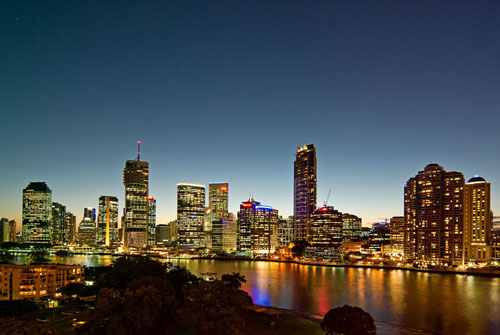
 Where are your serviced residence development hotspots in Asia-Pacific?
Where are your serviced residence development hotspots in Asia-Pacific?
The emerging hotspots are Chengdu, Wuxi and Tianjin in China, where Frasers Hospitality has established a presence and is planning continued growth.
Why are you focusing on these cities?
China’s burgeoning second- and third-tier cities are new areas that are experiencing rapid growth, as demonstrated by the influx of FDI and demand for travel accommodation. This is driven by rising business and leisure travel, due to the proliferation of high-tech and industry parks in these cities and a growing segment of middle-class consumers contributing significantly to the increase in leisure travel.

More business travellers are choosing to stay in serviced residences even on leisure trips, and leisure travellers are more aware of the benefits serviced apartments offer.
These high-growth second- and third-tier cities are key growth areas for Frasers Hospitality. Our China expansion strategy works on the strong demand for our serviced residences, as reflected in high occupancy rates since we set foot in the country and the numerous industry awards the brand has garnered in the region.
How are you expanding in these cities?
We plan to open the 192-unit Fraser Place Tianjin by 2015; the 307-unit Fraser Suites Tianjin, the 180-unit Fraser Place Chengdu; the second Modena by Fraser Wuxi with 120 units by 2017; and the 200-unit Fraser Suites Wuxi by 2019.
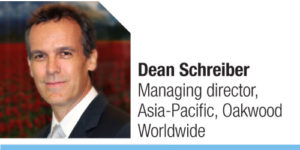 Where are your serviced residence development hotspots in Asia-Pacific?
Where are your serviced residence development hotspots in Asia-Pacific?
Besides China and India, current hotspots in Asia-Pacific include Brisbane in Australia, Colombo in Sri Lanka and Yangon in Myanmar.
Why are you focusing on these cities?
In Australia, serviced apartments are in high demand and short supply – a trend that shows no sign of slowing. The demand for quality accommodation is rising nationwide, Stimulated by growth in agriculture, telecommunications and construction.
Colombo is currently undergoing a dramatic transformation. Driven by Sri Lanka’s economic growth and infrastructure development, there has been greater urban migration towards Colombo, while a number of wealthy Sri Lankans are moving back to the city following the end of the country’s civil war, leading to demand for both luxury and affordable housing.
Myanmar is the other fast-growing South-east Asian state with a lot of strong initiatives championed by the government. The current shortage, along with the weak supply pipeline of serviced residences in Yangon, will pose challenges for new inbound expatriates. As the government grants more foreign business licenses, expatriate accommodation requirements will persistently rise amid limited quality housing options in the city.
How are you expanding in these cities?
We are constantly taking on projects in areas where there are aggressive developments initiated by both the government and private sectors. We look to double our existing portfolio in the near future and these markets will be the key thrusts in our business development.
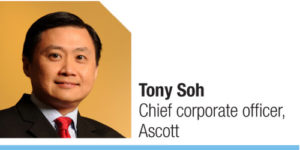 Where are your serviced residence development hotspots in Asia-Pacific?
Where are your serviced residence development hotspots in Asia-Pacific?
Ascott has 21 new cities in our serviced residences portfolio, and we plan to open over 20 serviced apartment properties in Asia this year.
We recently opened our first serviced residences in Sriracha, Thailand and Haiphong, Vietnam. Our first properties in China’s Wuxi, Ascott Central Wuxi and Somerset Wuxi, are also slated to open later this year.
Why are you focusing on these cities?
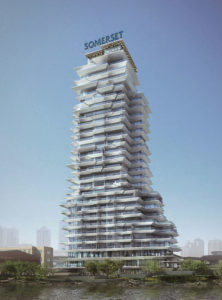
Ascott is the first international serviced residence operator in Sriracha and Haiphong.
Citadines Grand Central Sri Racha is close to industrial estates where many MNCs are based and is also near Pattaya. Situated in Vietnam’s third-largest city, Somerset Central TD Hai Phong City is in the new CBD where we foresee strong demand for quality accommodation.
Wuxi’s economy is growing steadily and its GDP exceeded RMB807 billion (US$130 billion) in 2013. With more MNCs and large local enterprises setting up in Wuxi, we expect healthy demand for our serviced residences by expatriates and local business travellers.
How are you expanding in these cities?
We have four properties in Sriracha, Haiphong and Wuxi so far, and we are open to opportunities. We will expand through investments, management contracts, strategic alliances and franchises.
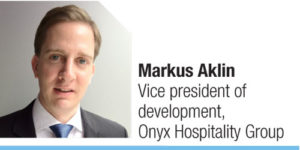 Where are your serviced residence development hotspots in Asia-Pacific?
Where are your serviced residence development hotspots in Asia-Pacific?
We are looking to expand our serviced apartment brands – Shama, which is well established in Hong Kong and China, and the Amari Residences in Thailand – not only within existing markets but also beyond new markets, which we feel will have a growing demand for this type of accommodation. Currently, we are looking at India, Indonesia and Malaysia as areas of expansion.
The specific cities include Jakarta in Indonesia, and Kuala Lumpur and Iskandar in Malaysia. At this point we are looking for both brown-field and green-field opportunities, and we plan to announce new projects soon.
Why are you focusing on these cities?
We are now looking into India, Indonesia and Malaysia because of the existing strong demand for corporate long-stay clientele – these are the key consumers of Shama and Amari Residences.
We have also seen a shift in the demand from long to short stays in residence-style accommodation, especially among families who are looking for more space and have (lower) priorities for (on-site) F&B facilities.
How are you expanding in these cities?
The Shama brand includes three tiers: Shama, the core brand providing luxury serviced apartments; Shama Luxe, the brand’s more premium tier featuring more spacious layouts with tailor-made furnishings and appliances; and Shama Lite, which was introduced in 2013.
Shama Lite is geared towards mid-market profiles with more compact units and are often located in residential areas, appealing to business travellers and families, whereas residences under the Amari brand present more facilities, including F&B, which is not typically available at Shama properties.
In the key areas of India, Malaysia and Indonesia, the location will dictate the brands we choose to introduce. For instance, as part of our recently announced expansion plans to India, we will be introducing the first Amari Residences at GIFT city in Gujarat, featuring 120 residences, one restaurant, a swimming pool and a fitness centre. After studying the market, we discovered that this product caters to the demands of guests, as they expect more facilities and services to be available, especially F&B. The number of keys will also depend on the space available, as we are looking at both green-field projects or existing structures.
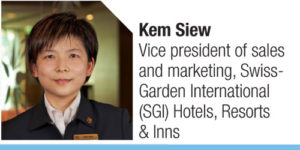 Where are your serviced residence development hotspots in Malaysia?
Where are your serviced residence development hotspots in Malaysia?
Kuantan, Malacca and Kota Bharu.
Why are you focusing on these cities?
These destinations attract tourists and corporates, which are our target markets. Choosing a location is important, as the serviced residences have to appeal to both corporate clients (for long stays of more than a month) and the tourists (for those staying for at least a night).
Swiss-Garden Hotel & Residences Malacca is located close to the historic core, and the Malacca Industrial Park is targeted mainly at tourists visiting Malacca for leisure or business events. The hotel has a large ballroom which can accommodate 840 guests in banquet seating and the serviced residences provide one, two- and three-bedroom options.
Swiss-Garden Resort Residences Kuantan is strategically located within the Malaysia-China Kuantan Industrial Park to attract mainly corporate clients and leisure tourists. Having the in-house Underwater City of Teruntum mini water theme park attracts families with young children and even extended families.
How are you expanding in these areas?
Expansion is through property management. For example, SGI is managing two new serviced residences – the 179-unit Swiss-Garden Resort Residences Kuantan with a mini water theme park and Swiss-Garden Hotel & Residences Malacca, with 484 serviced apartment units in one tower and 306 hotel rooms in another tower. Both properties opened in January 2015.
SGI will also manage its first serviced residence property in Kota Bharu with the opening of Pavilion Garden Suites in 1Q2017. This managed property will also be part of a mixed development.
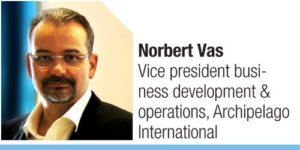 Where are your serviced residence development hotspots in Indonesia?
Where are your serviced residence development hotspots in Indonesia?
Definitely the top five cities of Jakarta, Surabaya, Medan, Bandung and Makassar; but the greater Jakarta area is really where most of the action is and will be.
For Archipelago International, however, Balikpapan is another success story. The city has a lot of demand from expatriates working in the oil and gas industry.
Why are you focusing on these cities?
Jakarta-based developers are more sophisticated and so are the clients; the market is mature and competitive, and the demand is there. Jakarta developers are aware of the pull a brand can bring to a residential project or serviced residence, and 20 to 30 per cent of the premium buyers are willing to pay.
There are also a few successful high-end luxury branded residences already in the market, so the next trend will be that more mainstream, upscale and mid-market brands like Aston are getting into the serviced residence markets.
How are you expanding in these cities?
We operate serviced residences in various cities across Indonesia, with the most successful ones located in Jakarta and Balikpapan. We currently have projects in Karawaci (west of Jakarta), the southern part of Jakarta and Surabaya.
This article was first published in TTG Asia, April 10, 2015 issue, on page 16. To read more, please view our digital edition or click here to subscribe
Additional reporting from Greg Lowe, Xinyi Liang-Pholsena, S Puvaneswary, Mimi Hudoyo




















